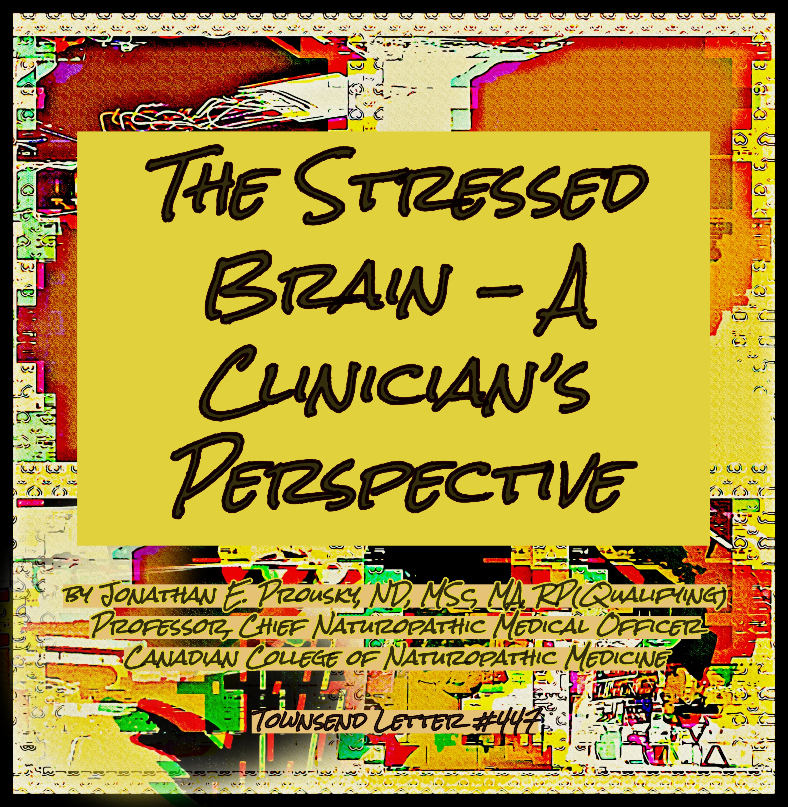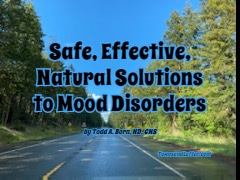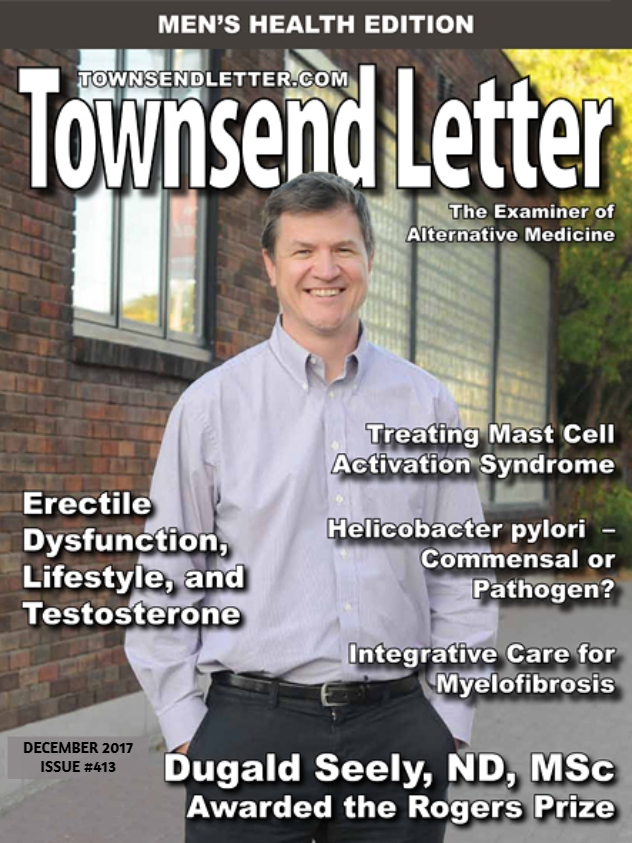…article continued:
Additional Strategies to Lessen the Impacts of Chronic Stress
Having practiced naturopathic medicine for over 20 years, and more recently as a psychotherapist, additional strategies need to be embraced by chronically stressed patients if they want durable improvements over time. I am certain that none of the strategies described below are my own original ideas, for I have learned them from clinical experience, training, and regular supervision. When many of these strategies are adhered to (including those mentioned previously), patients find themselves feeling better while gaining increased capacities to manage their chronic stress and complex lives.
Accept and learn to endure emotional discomforts. All chronically stressed patients need to learn that fighting their difficult emotions seldom works. It is actually better for patients to feel emotions without resistance. Tension is about resistance; relaxation is about acceptance and letting go. Working on acceptance is therefore essential, so when patients feel emotionally overwhelmed, they become more adept at coping with their difficult emotions. The more they resist, the more tension develops. Acceptance assists with living in the present, and not in the future or the past.
Additionally, for patients to improve means that they will have to accept what is happening (as described above) and allow the uncomfortable feelings to exist within. Emotions, though intense and sometimes powerful (and sometimes even destructive), are usually impermanent and will lessen. Patients must accept that they will not be able to go through life without experiencing regular discomforts, including periodic massive spikes in the levels of anxiety and depression, as well as other emotions. Setbacks are part of the process, and patients need to know that this will happen even when treatments have been consistently effective. As patients improve and become more emotionally tolerant, setbacks usually become less intense and less frequent. Patients can gain wisdom by understanding that their emotional maturity depends on their capacity to endure difficult experiences. The obvious caveat being, that if things do become too intolerable and/or extreme, they will likely need to go to the nearest emergency department for an evaluation and treatment.
Seek out inspiration through the success stories of other people. A wonderful way for patients to become more hopeful is by listening to podcasts or watching videos about people that have overcome enormous obstacles only to find life worth living again. Hope is something that all patients can access by listening or watching incredible stories. Just by doing some searching on the internet, patients should be able to find great stories of human triumph amidst incredible struggles.
Read (or listen) and learn. This is called bibliotherapy whether through reading or audio books. Patients must commit to self-help or other types of books that facilitate personal growth and/or increased psychological flexibility. They need to have sustainable methods of help in between office visits. Bibliotherapy is a tremendous way in which to develop additional skills of emotional regulation and chronic stress management.
Make decisions. It is unbelievable how often chronically stressed patients willingly refrain from rendering important decisions that, in most situations, would lessen their stress levels and heightened emotionality. I have personally seen patients stew in their own decisional paralysis for months and even years before taking concrete action on something that would invariably improve their emotional and physical well-being. Indecision keeps the brain locked in uncertainty and yields too much bottom-up control by the amygdala and other limbic structures. All decisions exclude other options, or as psychiatrist Dr. Irvin D. Yalom, MD, noted, “alternatives exclude.”135 Patients need to commit to making actual decisions to move their difficult lives forward; otherwise, they will not find the type of relief, contentment, and emotional freedom that is possible.
Accept responsibility. With almost predictable consistency, a large percentage of chronically stressed patients tell me that their misery is being caused because of someone else, or because of something else. And only if that someone else (or something else) would change, so too would their misery. Of course, I am well aware that there are malicious and horrible people in the world that do awful things to other people, such as stalking, abuse, extortion, oppression, etc. This is not what I am referring to when describing the importance of accepting responsibility. I sincerely believe that all patients must take deliberate personal action to change their circumstances for the better. Not accepting personal responsibility is just a version of learned helplessness, which denotes a self-imposed state of inertia even when viable options exist to significantly improve things. Patients need to mobilize themselves, sometimes matter over mind, to literally shift from their state of immobility, and overcome the stasis that has been ruining their lives.
No chemical treatment for mental health—whether naturopathic or otherwise—will result in a cure. Effective treatment will lessen the intensity of emotional overwhelm but cannot eliminate it. To additionally cope, all patients need to develop their own strategies of living that includes lots of self-care and purposeful work that confronts the very situations that cause anxiety and/or depression. Chemical treatment will not alter behavior though it may assist in facilitating important behavioral change. Some patients, for example, may experience anxiety when in social situations. Other patients, for instance, may feel guilty and bad about themselves and then socially isolate rather than spending time with their family and friends due to depression. Patients need to literally confront and immerse themselves in emotionally challenging situations (rather than avoid them) and learn that this type of committed approach is an essential part of their recovery and self-development.
Regularly do things that provide fun outlets. Having fun appears to be an underrated treatment or activity. Patients need to be encouraged to have fun so as to give their brains and minds a break. Sitting in front of a computer all day will not help, nor will isolation and the avoidance of real human connection. Patients will feel better by intentionally including fun activities into their daily routines.
End toxic relationships. Far too often therapists and other health professionals tell their patients to work harder and remain in their toxic relationships that have been horrible for many years. In fact, most patients have worked pretty hard at trying to make these brutal relationships work long before they have sought help. I take a different perspective. Plus, life is too short! Why try harder if misery has been a constant and omnipresent companion? Calling it quits can be liberating, health promoting, and often necessary for a person’s survival. That is why I am a strong believer that most patients in toxic relationships must find a way to emancipate themselves; otherwise, chronic stress will continue to wreak havoc on both their minds and bodies.
Don’t compare yourself to other people. I could easily find a person that is far more intelligent than I, far more attractive, has more money, and is way more capable in all the domains of life. Why should I do that to myself? It will only bring me down, resulting in dysphoria, anxiety, stress, and feelings of worthlessness. A much better strategy that I follow is to compare myself to who I was one day before. That way, I attain a realistic baseline and goals can be achieved. Heck, yesterday, I consumed too much processed meat (I happen to like pepperoni sticks), which is a weakness of mine. Today, I can commit to eating better and to not have any pepperoni sticks. This is a completely achievable strategy and works much better than comparing myself to other people. I often recommend that patients jot down 1-2 items to work on when comparing themselves to the day before. They often can reach their daily goals and end up feeling much better about themselves in the process.
Conclusion
There is nothing more difficult than trying to find regulation amidst the constant challenges and chaos of life. The net effect is that chronic stress will insert itself in some manner or another while life continually moves forward in time. One day you are 28 years old and feeling on top of the world, and then decades later you can’t believe that you are now 53 years old and suffering from relational loss and estrangement, chronic depression, prostate cancer, and metabolic syndrome. No one is spared. That is why numerous integrative treatments were discussed as viable options that target, regulate, and potentially optimize allostatic mechanisms. In promoting treatments that impact brain and body health, clinicians have a powerful role in materializing this information when working with their patients. Integrative approaches, such as those mentioned in this article, should serve as models of the kinds of interventions that can realistically and dramatically affect the course of chronic stress and prevalent medical diseases via allostatic brain mechanisms.








